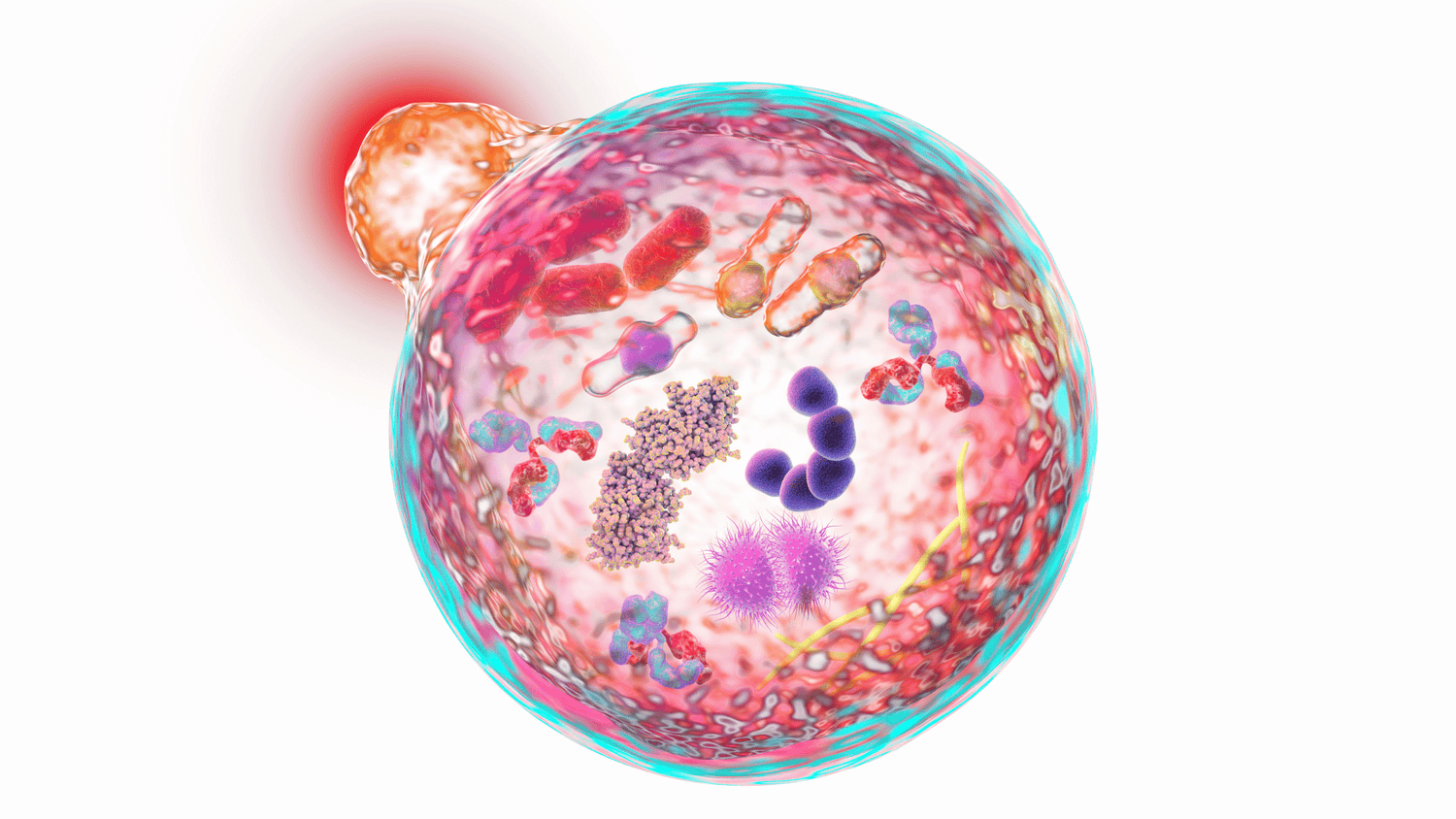In the realm of longevity and cellular health, a lesser-known molecule has been capturing the attention of researchers and health enthusiasts alike: spermidine. This naturally occurring polyamine holds promise in various aspects of health and longevity. In this comprehensive guide, we'll dive into spermidine's benefits, what spermidine is, its potential uses, and the foods rich in this fascinating compound.
What Is Spermidine?
At its core, spermidine is a polyamine, a class of organic compounds found in all living cells. It is crucial in cell growth, differentiation, and overall cellular function. Spermidine is derived from the amino acid methionine and is involved in various biochemical processes within the body (R).
What Is Spermidine Used For in the Body?
The functions of spermidine within the body are diverse and intriguing, contributing significantly to our overall health and well-being. Here's a glimpse into the various roles spermidine plays in the human body:
Autophagy Enhancement:
One of the most remarkable roles of spermidine is its ability to stimulate autophagy—a process through which the body removes damaged or dysfunctional components within cells. Autophagy is often referred to as the body's "cellular recycling system," it's crucial for maintaining cellular health and preventing the accumulation of toxic substances (R, R).
Anti-Aging Effects:
Spermidine has gained attention for its potential anti-aging properties. By promoting autophagy, spermidine may help cells stay healthier and live longer, contributing to overall longevity (R, R).
Cardiovascular Health:
Spermidine can effectively lower blood pressure, thereby reducing the strain on the heart and diminishing the risk of hypertension-related complications. Moreover, it enhances blood vessel function by promoting vasodilation, ensuring optimal blood flow and reducing the likelihood of atherosclerosis. Additionally, spermidine's anti-inflammatory properties are pivotal in safeguarding the cardiovascular system against inflammation-induced damage (R).
Neuroprotection:
Spermidine shows promise in supporting brain health. It may protect against neurodegenerative diseases like Dementia, Alzheimer's and Parkinson's by enhancing autophagy and reducing the accumulation of misfolded proteins in the brain (R, R, R).
Immune Modulation:
Spermidine has been found to modulate the activity of immune cells, such as macrophages and T cells, to promote a balanced immune response. This means it can help regulate the immune system's reaction to potential threats, preventing excessive inflammation that can lead to chronic health issues (R).
The Benefits of Spermidine
Now that we've explored what spermidine is and its potential uses let's delve deeper into the remarkable health benefits of spermidine:
Enhanced Cellular Health:
Spermidine's capacity to stimulate autophagy represents a significant breakthrough in cellular health. Autophagy is a fundamental cellular process that removes damaged or dysfunctional components, ensuring cells operate at their best. Spermidine's role in enhancing this mechanism is a game-changer for overall well-being.
Spermidine promotes cellular rejuvenation by efficiently disposing of cellular waste and damaged organelles. This, in turn, can lead to improved cellular function, increased energy production, and reduced harmful substances that can contribute to various health issues (R).
Longevity:
The intriguing anti-aging potential of spermidine centres on its capacity to nurture healthier cellular aging, which could translate into an extended, more vibrant life. Human observational studies have unearthed a compelling correlation: individuals with increased spermidine consumption tend to experience reduced all-cause mortality rates.
This heightened intake has sometimes been tentatively linked to life expectancy extensions exceeding five years. This suggests that spermidine's influence on cellular processes, such as autophagy and oxidative stress mitigation, may hold the key to living longer and enjoying a higher quality of life in our later years (R, R).
Heart Health:
Spermidine's role in improving blood pressure, enhancing blood vessel function, reducing inflammation, and protecting against oxidative stress makes it a promising compound for promoting cardiovascular health (R, R).
Brain Protection:
Spermidine promotes autophagy, reduces oxidative stress and inflammation, protects against excitotoxicity, and supports overall brain health. This makes it a promising candidate for interventions to preserve brain function and reduce the risk of cognitive decline in individuals at risk of or affected by neurodegenerative diseases (R, R, R).
Anti-Inflammatory:
Spermidine has been shown to inhibit the production and release of pro-inflammatory molecules, such as cytokines and chemokines, from immune cells. These molecules are responsible for initiating and sustaining the inflammatory response in the body. By reducing their production, spermidine can help dampen the overall inflammatory process (R).
Improved Mood:
Spermidine may support neuroplasticity, reducing oxidative stress, and promoting healthy neurotransmitter balance. This may improve emotional stability and overall mental health. Spermidine's ability to enhance autophagy also helps remove cellular debris linked to mood disorders (R).
Health Benefits of Spermidine: What the Research Tells Us
Spermidine, has been increasingly recognised for its potential health benefits. Research and studies have shed light on its multifaceted effects:
Longevity and Health Span Enhancement: Studies have shown spermidine may help protect against diseases like cancer, metabolic disease, heart disease, and neurodegeneration, suggesting a role in promoting healthy aging and longevity (R).
Cardioprotective Properties: Research in rodent models has revealed spermidine's potent cardioprotective properties. For example, middle-aged mice given spermidine-supplemented drinking water showed a 10% increase in median lifespan, improvements in diastolic function, and cardiomyocyte composition. Additionally, spermidine intake was inversely associated with risks of fatal heart failure, heart failure, and other vascular diseases in humans (R, R).
Liver Protection: Spermidine has been shown to confer liver protection by enhancing NRF2 signalling through a MAP1S-mediated noncanonical mechanism. This mechanism plays a crucial role in mediating the health benefits of spermidine, particularly in the context of liver pathologies (R).
Cognitive Benefits: Ongoing trials aim to assess spermidine's impact on memory performance and other neuropsychological, behavioural, and physiological parameters in older individuals with subjective cognitive decline. This research could establish spermidine supplementation as a preventive strategy against cognitive decline and Alzheimer’s disease (R).
Gut Health and Obesity: Spermidine supplementation has been correlated with significant weight loss and improved insulin resistance in diet-induced obese mice. It's linked to enhanced intestinal barrier function and alterations in gut microbiota composition, suggesting its potential as a therapy for obesity (R).
Anti-Inflammatory and Antioxidant Effects: Studies have demonstrated spermidine's effectiveness in reducing pro-inflammatory and oxidative effects in various models, highlighting its potential as a therapeutic intervention for inflammatory and oxidative disorders (R).
Potential in Cancer Therapy: Spermidine has emerged as a potential target for cancer therapy. Recent epidemiological data support that supplementation can reduce overall mortality associated with cancers, suggesting a role in the precise regulation of polyamine metabolism, anti-cancer immunosurveillance, autophagy, and apoptosis (R).
What Foods Are High in Spermidine?
Now that we've explored the benefits of spermidine, you might be wondering how to incorporate it into your diet. Fortunately, several foods are naturally rich in this valuable compound. Here are some spermidine-rich foods (R):
1. Wheat Germ:
Wheat germ is one of the best dietary sources of spermidine. It's packed with nutrients and makes a nutritious addition to cereals, smoothies, or baked goods.
2. Soybeans:
Soybeans, including tofu and tempeh, contain significant amounts of spermidine. They are versatile ingredients that can be included in various dishes.
3. Mushrooms:
Certain types of mushrooms, such as shiitake and white button mushrooms, are good sources of spermidine. They add flavour and depth to various recipes.
4. Broccoli:
This nutrient-rich vegetable contains spermidine and offers a host of other health benefits. Incorporate broccoli into salads, stir-fries, or steamed side dishes.
5. Green Peas:
Green peas are not only a source of spermidine but also provide essential vitamins and fibre. They make a tasty addition to soups and side dishes.
6. Spinach:
Spinach is another vegetable that contains spermidine. It's a versatile ingredient used in salads, smoothies, and cooked dishes.
Conclusion
Spermidine is a fascinating molecule with a growing body of research supporting its role in cellular health, longevity, and overall well-being. By understanding the benefits of spermidine, what it's used for and its dietary sources, you can take steps to incorporate this valuable compound into your daily life.
Whether aiming to support your cellular health, promote longevity, or protect your brain, spermidine offers a promising avenue for enhancing your overall health and vitality.





